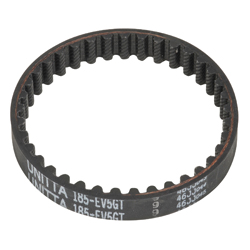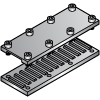(!)NOTE : Windows 7 users won’t be able to use some latest features of eCatalog/WOS since Microsoft is ending support for Windows 7 on 14 Jan, 2020. Please upgrade your system for uninterrupted services.
- Notice of End of Sales for Economy Series Pneumatic Equipment Category. More information.
UNITTA Timing Belt(Belt Series:EV5GT)
Brand |
|
|---|---|
| CAD |
|
| Days to Ship |
|
1 items
- Sort By
-
You can add up to 6 items per a category to the compare list.

Power Grip EV Belt, EV5GT Type
UNITTA
Power Grip EV Belt, EV5GT Type
It is a circular tooth profile timing belt. This belt always uses for high torque transmission on an automation machine
[Features]
• Belt Shape: Closed End
• Belt Tooth Type: EV5GT (circular tooth profile)
• Tooth Pitch: 5 mm.
• Belt Width: 9, 12, 15, 20, 25, 30 and 40 mm.
• Circumference Length Shortest/Longest: 185 mm. and 3640 mm.
• Material:
Tooth rubber: Chloroprene
Core wire: Glass Fiber
[Applications]
Suitable for use with a timing pulley in a transmission system in an automation machineBelt Series Belt Shape Nominal Width W (mm)(mm) Belt Material Belt Tooth Surface Core Wire Material Nominal Width W (Inch)(Inch) Belt Shape Type EV5GT Closed End 9 ~ 40 Rubber Belt Standard (Single Sided) Glass Fiber - Circular Tooth Profile EV Belt From: ₹ 897.25 Days to Ship: 5 Day(s) or more  5 Day(s) or more
5 Day(s) or more
| Brand |
|---|
| Product Series |
| From |
| Days to Ship |
| Belt Series |
| Belt Shape |
| Nominal Width W (mm)(mm) |
| Belt Material |
| Belt Tooth Surface |
| Core Wire Material |
| Nominal Width W (Inch)(Inch) |
| Belt Shape Type |
You can add up to 6 items per a category to the compare list. | |
| Brand | UNITTA |
| Product Series | |
| From | ₹ 897.25- |
| Days to Ship | 5 Day(s) or more |
| Belt Series | EV5GT |
| Belt Shape | Closed End |
| Nominal Width W (mm)(mm) | 9 ~ 40 |
| Belt Material | Rubber Belt |
| Belt Tooth Surface | Standard (Single Sided) |
| Core Wire Material | Glass Fiber |
| Nominal Width W (Inch)(Inch) | - |
| Belt Shape Type | Circular Tooth Profile EV Belt |
Loading...
Configure
Specification/Dimensions
-
Belt Series
-
Belt Shape
-
Nominal Width W (mm)(mm)
-
Belt Material
- Rubber Belt
- Polyurethane Belt
-
Belt Tooth Surface
-
Core Wire Material
-
Nominal Width W (Inch)(Inch)
-
Belt Shape Type
Narrow search by specifying Manufacturer
-
- MISUMI (1)
- UNITTA (1)
- BANDO CHEMICAL (0)
- BEIDI (0)
- KATAYAMA CHAIN (0)
- NOK (0)
- MITSUBOSHI BELTING (0)
- NABEYA BI-TECH (0)
Related Categories to Timing Belt
FAQ's Timing Belts
- Question: What is a timing belt?
- Answer: A timing belt is a toothed belt that synchronizes the rotation of the crankshaft and camshaft in an internal combustion engine. It is responsible for ensuring that the valves open and close at the correct time in relation to the piston movement.
- Question: Why choose MISUMI timing belts?
- Answer:
MISUMI timing belts offer a number of benefits over other timing belts on the market. These belts are made by leading Asian manufacturers, and we carefully select them as per our customers' requirements. Here are some specific advantages of MISUMI timing belts:
Competitive pricing: MISUMI timing belts are competitively priced, making them a good value for your money.
High quality and reliability: MISUMI timing belts are made with high-quality materials and are manufactured to strict quality standards. This ensures that they are reliable and durable, even in demanding applications.
Wide selection: MISUMI offers a wide variety of timing belts to choose from, with different tooth profiles, materials, and sizes. This allows you to find the perfect timing belt for your specific needs.
High transmission efficiency: MISUMI timing belts have a high transmission efficiency, which means that they can transfer power from one shaft to another with minimal loss.
Low noise: MISUMI timing belts operate quietly, even at high speeds. This is ideal for applications where noise is a concern.
Long lifespan: MISUMI timing belts have a long lifespan, even in demanding applications. This is due to their high quality and durability.
Wide operating temperature range: MISUMI timing belts can operate in a wide range of temperatures, making them suitable for a variety of applications.
Resistance to chemicals and oils: MISUMI timing belts are resistant to chemicals and oils, making them suitable for use in harsh environments. - Question: Why is a timing belt important?
- Answer: A timing belt is essential for the proper operation of an internal combustion engine. If the timing belt breaks or slips, it can cause serious engine damage, including bent valves, broken pistons, and cracked cylinder heads.
- Question: How often should I replace my timing belt?
- Answer: The recommended timing belt replacement interval varies depending on the make and model of your vehicle. However, most manufacturers recommend replacing the timing belt every 60,000 to 100,000 miles.
- Question: What are the symptoms of a bad timing belt?
- Answer:
Some of the symptoms of a bad timing belt include:
1. Engine misfire
2. Rough idle
3. Reduced engine performance.
4. Ticking or whining noise from the engine.
5. Oil leaking from the timing belt cover. - Question: What happens if my timing belt breaks?
- Answer: If your timing belt breaks, the engine will immediately stop running. In some cases, a broken timing belt can cause serious engine damage, such as bent valves, broken pistons, and cracked cylinder heads.
- Question: What is the difference between a timing belt and a timing chain?
- Answer:
The main difference between a timing belt and a timing chain is the material they are made of. Timing belts are made of rubber, while timing chains are made of metal.
Timing belts are less expensive to produce and quieter in operation, but they need to be replaced every 55,000-90,000 miles. Timing chains are more expensive and louder in operation, but they can last the life of the engine.
Another difference between timing belts and timing chains is their location. Timing belts are located outside of the engine, while timing chains are located inside of the engine. This means that replacing a timing belt is a less complex and less expensive job than replacing a timing chain.











How can we improve?
How can we improve?
Thank you for your time.
Your feedback is essential for our continuous improvement
Privacy Policy
Thank you for your cooperation.
Thank you for your time.
Your feedback is essential for our continuous improvement
Please use the inquiry form.
Privacy Policy